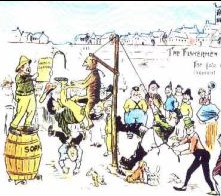
We have very little idea of how a hysteria can grip sensible, rational people – until it strikes. After Orson Welles’s War Of The Worlds radio broadcast, the public reported sightings of Martians. According to urban legend, a farmer’s water tower was peppered with small arms fire, in the belief that it was a Martian spaceship. During the McCarthyite Red Scare, the FBI’s snitch lines rang red hot with reports of suspected un-American activity. And in Hartlepool 200 years ago, the locals tried and hanged a monkey, suspecting it to be a Frenchman.
Here’s more evidence that the Net Neutrality scare is gripping otherwise rational people, presenting with two classic symptoms of mob-itis.
Professor Steven Bellovin of Columbia reported something strange with his Comcast router recently. Bellovin is a veteran crypto researcher with internet RFCs to his name – and not normally someone who needs attention. Last month he announceD:
“My cable modem service was out for eight hours yesterday. Tests I did – ICMP could get through to various destinations; TCP could not – make me believe that the problem is due to Comcast trying to treat p2p traffic differently.”
Of course. What else could it be?

